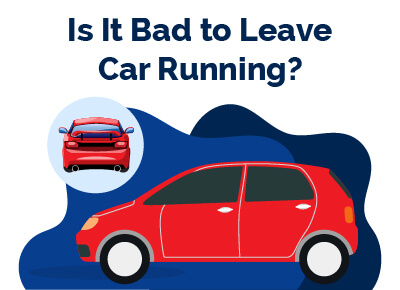Is It Bad To Leave Your Car Running?
July 23, 2023


Chris is Head of Content for FindTheBestCarPrice and is based out of Philadelphia, PA. As a seasoned automotive industry analyst and car enthusiast, he ensures the highest level of quality across all our content and curates our picks for the best deals each month.
Chris studied information systems and marketing at Drexel University and writes about a wide range of topics ranging from car buying tips to troubleshooting common mechanical issues.
When he’s not thinking about cars, he likes to stay in with his dog and make an “attempt” to finish a crossword puzzle (he’s not quite at the Saturday/Sunday level…yet). As a former cheesemonger, Chris still has a “sharp” passion for all things cheese, and his fridge is always loaded with it!
Chris also has a passion for things that go fast, and drones are no exception. He spends some of his time writing for Dronesourced.
Leaving your car running while it's parked may seem like a convenient option, especially during cold weather or when you need to run a quick errand.
However, it's important to consider the potential consequences of leaving your car running for an extended period of time. Not only can it waste fuel and harm the environment, but it can also damage your engine and pose a safety risk.
Let’s explore the effects of leaving your car running, including the impact on your car's engine, battery, and environment. We will also provide tips on when it's safe to leave your car running and when it's best to turn it off.
Whether you're a seasoned driver or a new one, read on to learn more about the potential dangers of leaving your car running and how to protect your vehicle and the environment.
Table of Contents
- What Does It Mean To Leave Your Car Running?
- Is It Bad To Leave Your Car Running?
- What Will Happen When You Leave Your Car Running for Long Periods?
- Constant Energy Production and Heat Generation
- How Long Can You Leave Your Car Running?
- When Should You Leave Your Car Running?
- Best Car Deals by Category
- Frequently Asked Questions
What Does It Mean To Leave Your Car Running?
Idling is leaving your car's engine running without moving the vehicle. While in an idle state, the car is still powered on and has the potential to move at any time, if not for other systems and components like brakes and transmissions that keep it in place.
Many people have found themselves idling their cars out of necessity. This often happens automatically when stuck in traffic and expecting to move again soon or when running into a store quickly and leaving the car running.
Another example is on cold winter mornings when drivers may start their cars to warm up the interior cabin before driving to work.
Is It Bad To Leave Your Car Running?
While it may be comforting to know that allowing your automobile to idle does not engender harmful effects, it is imperative to acknowledge that idling is not necessarily a wise choice.
A significant apprehension about human safety is the peril of carbon monoxide poisoning.
You should refrain from running your vehicle in a confined area, such as a garage, as it could be detrimental or potentially lethal. It is only safe to idle your car in a well-ventilated area, such as the outdoors.
Not only can idling lead to the depletion of your car's gas supply over an extended period, but it can also result in a drained battery due to the slow-running engine drawing power from it.
Although the alternator persistently replenishes the battery while the vehicle remains idle, other electrical elements, such as the headlights and radio, may concurrently be drawing power from the battery.
Furthermore, idling may cause your engine to overheat, mainly if there is an existing mechanical issue. Long-term idling can also result in wear and tear of the head gasket, spark plugs, and cylinder rings.
It is best to limit idling to a few minutes at most. After that, switching off the engine or moving your vehicle is recommended. J.D. Power advises turning off your car or switching to a newer vehicle equipped with an automatic stop-start feature, even in traffic.
For older cars, idling is preferable to starting and stopping multiple times, particularly when running low on gas. Starting the engine uses more fuel than leaving it on briefly.
Aside from the negative environmental impact of burning gas and oil, idling is also detrimental to the environment by increasing air pollution through emissions from the exhaust system. Some states have imposed restrictions on idling for this reason.
It is known that idling your car engine for more than ten seconds uses more fuel and releases more emissions that contribute to climate change than stopping and restarting. Turning off your car reduces emissions and saves on gas costs.
While leaving your gas-powered car's engine running for an extended period may be acceptable for the car, it puts it at risk of mechanical issues, an empty gas tank, or a drained battery.
Also, idling is environmentally unfriendly, making it a poor choice for your vehicle and the planet.
What Will Happen When You Leave Your Car Running for Long Periods?
Leaving your car running cooling system for long periods can harm your vehicle, ranging from fuel inefficiency to permanent engine damage. Let's explore the reasons why idling your car is a bad idea.
Constant Energy Production and Heat Generation
Your car's engine continuously produces energy, which generates heat. A cooling system is necessary to prevent overheating.
While some systems use coolant, others rely on airflow, which decreases when the car stops moving.
1. Gas Wastage
Idling your car wastes approximately one gallon of gas per hour, so it's best to avoid it, especially if you have an older vehicle or a small gas tank.
Contrary to popular belief, idling your car to warm it up is unnecessary and damaging. Experts recommend idling for no more than 30 seconds to get the fluids flowing.
2. Environmental Impact
Idling vehicles release harmful emissions like carbon dioxide into the atmosphere, contributing to global warming.
The EPA estimates that idling for ten seconds emits more pollution than restarting your engine. Idling also generates about 30 tons of CO2 each year, which adds up and harms the environment.
3. Decreased Vehicle Performance
Prolonged engine idling causes overheating, which damages essential components like head gaskets, spark plugs, radiators, and cylinder rings.
This reduces vehicle performance and can even lead to permanent engine damage.
Overheating also affects the exhaust system, alternator, and oil, burning off the oil more quickly and leaving behind a sticky residue.
4. Battery Drainage
Idling your car does not charge the battery and can drain it faster, especially in older vehicles. To avoid unnecessary battery drain, it's best to idle your car only when necessary.
How Long Can You Leave Your Car Running?
Although idling your engine is not inherently detrimental, it is not advisable to do so excessively.
There are limits to how long you can keep your car running before you risk encountering issues or causing mechanical malfunctions.
It is important to remember that idling involves running your engine at low power continuously. Your engine could run endlessly in a hypothetical scenario where fuel is infinite.
Notwithstanding, reality reveals many plausible issues that could manifest if you allow your car to idle for a protracted duration.
Therefore, it is prudent to restrict the idling period to a few minutes, halt the engine, or shift your vehicle to a different location.
Many drivers let their cars idle for more than a few minutes when they anticipate frequent stops and starts, such as driving in heavy traffic in a large city. However, the belief that repeatedly starting and stopping the engine is harmful is unfounded.
Even if you are stuck in traffic and anticipate moving only a few meters every few minutes, feel free to start and stop your engine multiple times.
Modern engines from the 1990s incorporate fuel injection components that efficiently deliver fuel to your engine and prevent oil dilution.
Barring any cars from the 1980s or prior, one need not be overly concerned about inducing excessive wear and tear on their engine by repeatedly turning it on and off.
When Should You Leave Your Car Running?
Notwithstanding the previously stated hazards, certain circumstances exist in which it may be justifiable to allow your automobile to remain operational instead of shutting down the power plant. These include:
When you're warming up your vehicle during winter, you intend to run the engine briefly.
When you're stopped at a traffic light, even if the light lasts several minutes, in this scenario, turning off and restarting the engine could cause undue delays for other drivers behind you.
When running low on fuel and trying to reach a gas station, starting your engine consumes more gas than simply keeping it idling in many cases.
Therefore, keeping your car running and idling is advisable if you're low on fuel and trying to get to safety.
Best Car Deals by Category
Frequently Asked Questions
How long can you leave your car running before it gets damaged?
The precise time frame relies on many factors, including the vehicle's make and model and the engine's condition. In general, authorities advise against letting your vehicle idle for over 10 minutes per instance.
Can idling your car waste gas?
Yes, idling your car can waste a significant amount of fuel. The fuel a vehicle consumes while idling can vary depending on its specific make and model, typically ranging from 0.2 to 0.5 gallons per hour. This results in heightened fuel expenditure and correspondingly elevated costs.
Can idling your car drain the battery?
Yes, idling your car can drain the battery, especially if it's older. The alternator may not produce enough power to keep the battery charged when the engine is idling, leading to a dead battery over time.
Is it better to turn off your car or leave it running?
In most cases, it's better to turn off your car if you're going to be stationary for more than a minute. Turning off your engine saves fuel, reduces wear and tear on the engine, and helps prevent battery drain. Exceptions may include keeping your engine running to power accessories like air conditioning or heating.
Posted in Car Buying Tips, Car Troubleshooting |




